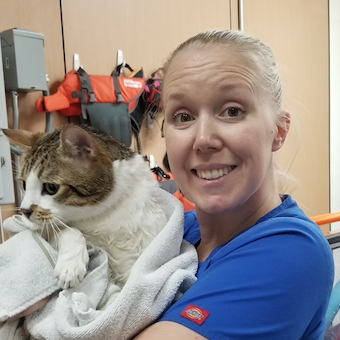Trigger warning: suicide & self-harm
Our profession is rewarding, yet incredibly demanding. We bear the weight of patients, pet parents, co-workers, and our own internal experience. When your work involves immense passion, it’s easy to give so much of yourself away caring for others.
It is incredibly important that we commit to honoring the mental health of our colleagues and committing to caring for ourselves.
Veterinarians are 3 times more likely to die from suicide than the general public. Only 26% of veterinary support staff say they’re doing mentally “well.” 83% of veterinary professionals report they have anxiety. 95% of veterinary employees report being emotionally exhausted at work.
Meaning the vast majority of our workforce is coming into work stressed, anxious, burned out, browned out, or bored out.
“When I was a practice manager,” Danielle Grimley, CCO at Vet2Pet remarks, “I went to a conference where the speaker pointed out that our standard for a ‘good day’ in vet med is when ‘nobody died, nobody cried, and everyone went home on time.’”
Not exactly a breeding ground for employee engagement, positivity, and flourishing.
Vet med is in a mental health crisis - and we must be intentional in our support of our people.
Culture is the single strongest strategy in supporting the wellbeing of our people. We dove deep into this in The Ultimate Guide for Awesome Culture in Veterinary Medicine.
3 Ways to Honor Your Veterinary Staff’s Mental Health
1. Focus on togetherness
“The best way to honor mental health is by putting their staff first,” Shena Humbert, Founder at Not Another Vet Nurse explains. “[It] will not only help the individual, but in turn, it will help the clinic. Having a healthy mentally sound employee will allow them to perform at their absolute best, therefore improving patient care. This will help cultivate a positive veterinary atmosphere for both employees and clients.”
Togetherness was the #1 reason veterinary professionals thought their team culture was “good.”
And it’s the #1 thing veterinary professionals think needs to change to make their culture better.
Are you investing in team building? Social gatherings? Team cohesiveness?
When people care personally about the people around them, they’re more productive, kinder, and more empathetic to one another — making your practice a safer, and more healthy place to work.
2. Compensate your people better
Cost of living has gone up 7% in the last 12 months. Without at least the security of a living wage, your employees’ mental wellbeing will struggle to flourish.
On Maslow’s hierarchy of needs, basic needs (like food, rest, shelter, and safety) are a fundamental need for all humans. Without them, we fail to develop the rest of our needs, including things like belonging, self-esteem, and reaching our full potential.
This is why compensation has a direct link to mental health. Compensating your people well and being sure they’re financially secure provides your team with economic safety and security — allowing them to focus and grow as employees.
And, often, mental health care is not included in base health plans (consider offering mental health solutions in your benefits package!). As a profession that often deals with trauma, compassion fatigue, and high-stress situations, we must encourage and improve access to care to comprehensive mental health care to our staff.
3. Lead with compassion
“Fighting stigma, creating open, honest dialogue, and providing access to resources creates a safe and compassionate culture,” Darlene Bos, Executive Director of Not One More Vet notes.
There will be bad days — in and out of the practice. By leading always with a sense of compassion and true care for your staff, you’re helping them get their needs met, and come to work mentally healthy and secure — ready to take on the shift.
This also means showing yourself compassion.
“We are so good at bending over backward to care for our patients,” remarks Danielle. “We go above and beyond to make our clients’ lives easier. But for some reason, we struggle to devote the same, consistent energy to ourselves and invest in our own health without feeling guilty, selfish, or lazy. This comes from a false perception that our needs are not as important as our patients, clients, coworkers, or the business.”
When you take care of your needs first, you’re then able to do the same for everyone else in your life — staff, peers, family, friends, and clients.
Want to explore more practical tips?
Check out the section on vulnerability & compassion in The Ultimate Guide for Awesome Culture in Veterinary Medicine.
Want to share some of your favorite practical tips?
Collaborate on an article with us! (Email sara@hound.vet for details.)
From the Experts
From Danielle Grimley, Chief Culture Officer @ Vet2Pet:
“When I was a practice manager, I went to a conference where the speaker pointed out that our standard for a “good day” in vet med is when “nobody died, nobody cried, and everyone went home on time.” This painfully accurate statement describes just how low of a bar we set for ourselves working in this field. The time is here (and long overdue) to raise that bar from merely surviving each day to thriving, and it starts with honoring ourselves first.
We are so good at bending over backward to care for our patients. We go above and beyond to make our clients’ lives easier. But for some reason, we struggle to devote the same, consistent energy to ourselves and invest in our own health without feeling “guilty,” “selfish,” or “lazy.” This comes from a false perception that our needs are not as important as our patients, clients, coworkers, or the business.
But once you recognize that this “imposter syndrome” voice is quite frankly BS, the easier it gets to ignore. I promise that the practice will not burn down if you take an afternoon off for a doctor’s appointment. However if you don’t take time for those doctor’s appointments (or whatever kind of self-care you are sidelining), you won’t be bringing your best self to the table, and that is ultimately more detrimental than being out half a day.
Honoring our mental health is not just beneficial to improving culture–it’s actually essential because it sets an example for those around us by modeling healthy behaviors we want to see replicated. This is especially true for anyone in a position of leadership to show the team that wellbeing is a priority and establish an expectation that you are not only allowed but empowered to put your mental health first. Taking time to care for yourself and recharge proactively (instead of waiting until you are in crisis) benefits you AND your patients, clients, coworkers, etc.
We just have to start ignoring that imposter syndrome and trusting that the way to help others is truly to help ourselves first."
From Shena Humbert, Founder @ Not Another Vet Nurse:
Veterinary medicine is already an emotional rollercoaster as it is, yet we are squeezing every last bit out of our people. There are many ways we can honor mental health but it starts by recognizing there is a problem within their clinic.
The best way to honor mental health is by putting their staff first. It is scheduling appointments based on staffing so you don’t overwork your staff. Burnout and compassion fatigue lead to poor mental health. By limiting the amount of stress on the people we are putting their mental health first. It is allowing mental health days when people are tapped out so they can take the time they need to feel better. It is taking weekly or monthly meetings to check in with your staff and see how they are mentally. Guide people to the proper resources based on where they are; give them the avenues to succeed with their mental health.
Honoring mental health in veterinary medicine will not only help the individual, but in turn, it will help the clinic. Having a healthy mentally sound employee will allow them to perform at their absolute best, therefore improving patient care. This will help cultivate a positive veterinary atmosphere for both employees and clients.
From Darlene Bos, Executive Director @ Not One More Vet:
Leaders in vet med honor everyone when they emphasize the importance of mental health and engage with actionable resources to provide the means to support their staff. They honor themselves by taking care of their own mental health, ensuring their needs are met as well.
Fighting stigma, creating open, honest dialogue, and providing access to resources creates a safe and compassionate culture. Working together we will transform the status of mental wellness in the profession.




.png)


.gif)


